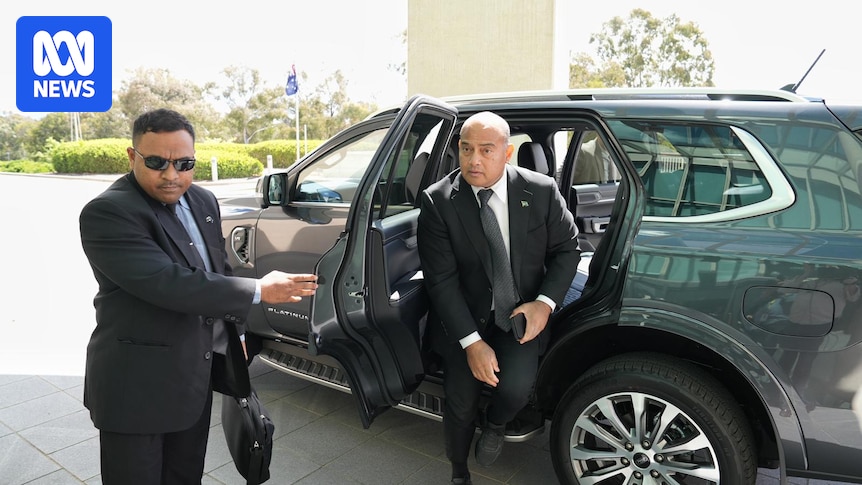
Nauru’s President, David Adeang, has made a secretive visit to Parliament House in Canberra, stirring controversy amid claims that outlaw motorcycle gangs have secured a lucrative contract on the Pacific Island. The visit, which occurred less than two weeks after the first members of the so-called NZYQ cohort were quietly sent to Nauru, has raised questions about transparency and governmental secrecy.
Adeang arrived at the Senate entrance of Parliament House just before 3 PM today, in a visit that was not publicly announced by either the Australian or Nauruan governments. Onlookers noted his swift departure just half an hour later, during which he declined to answer any questions from the media, including the ABC.
Meetings with Key Australian Ministers
According to sources, President Adeang met with Home Affairs Minister Tony Burke during his brief visit. Additionally, it is understood that he had discussions with Foreign Minister Penny Wong and Pacific Minister Pat Conroy. A car bearing the Nauruan flag was spotted outside Parliament House yesterday, indicating Adeang’s presence in Canberra for a dinner event last night.
The clandestine nature of these meetings has drawn criticism from various political factions and civil society groups. The Coalition and the Greens have voiced strong opposition to the government’s dealings with Nauru, particularly the agreement to resettle the NZYQ cohort.
Government Secrecy Under Scrutiny
Greens Senator Sarah Hanson-Young has been vocal in her demand for the government to explain the lack of transparency surrounding the high-level visit. She expressed concerns about the secretive nature of the deal with Nauru, stating,
“This government does have a growing problem with secrecy, a growing problem with transparency. They seem to be allergic to transparency and openness.”
Hanson-Young criticized the government’s approach to handling asylum seekers, accusing it of using Nauru as a “prison island” and condemning the practice as “barbaric.” Her comments reflect a broader sentiment among critics who argue that Australia is shirking its responsibilities to those seeking safety and protection.
Allegations of Bikie Gang Involvement
The visit comes in the wake of reports by Nine newspapers that the Finks outlaw motorcycle gang has infiltrated operations on Nauru. Allegations suggest that the gang won a key taxpayer-funded contract to provide security for former immigration detainees on the island.
These claims have added another layer of complexity to the situation, with Prime Minister Anthony Albanese stating that the issue pre-dates his government. He commented,
“The minister will respond to that, but I note that those issues, as I read them, come from a period before we were in government.”
Financial and Humanitarian Implications
The first member of the NZYQ cohort was quietly deported to Nauru late last month, marking the beginning of a plan to deport hundreds of convicted criminals to the island. Australia has agreed to pay Nauru $408 million upon the arrival of the first deportee, with an additional yearly sum of up to $70 million to be paid over the next 30 years, contingent on the number of people transferred.
These financial commitments have raised eyebrows, with critics questioning the long-term implications for both Australian taxpayers and the individuals being resettled. The arrangement has sparked a debate about Australia’s immigration policies and its ethical responsibilities.
As the situation unfolds, the Australian government faces increasing pressure to clarify its stance and provide greater transparency regarding its dealings with Nauru. The controversy surrounding President Adeang’s visit and the alleged involvement of bikie gangs in security operations underscores the need for open dialogue and accountability.







